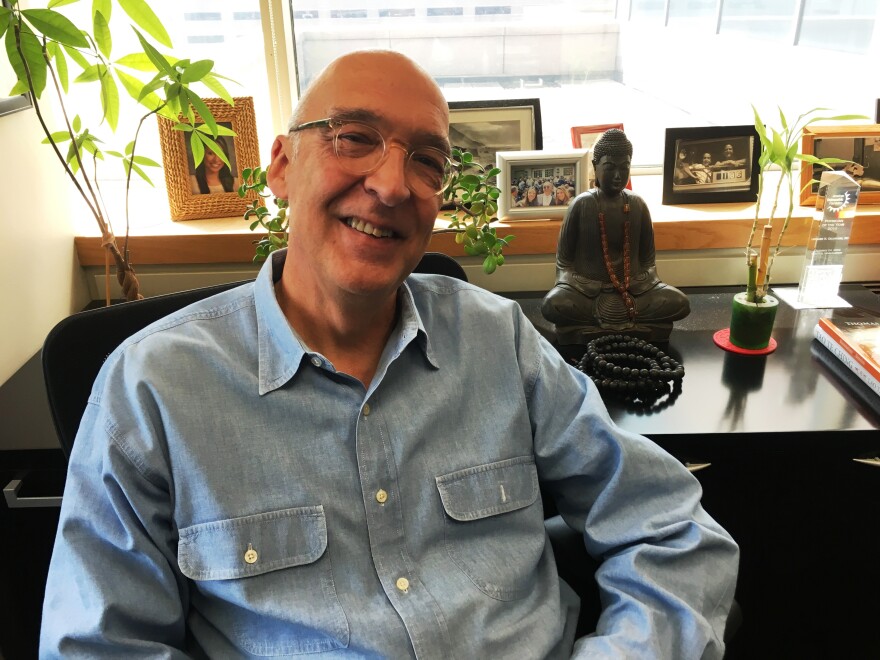It’s no longer the headline- grabbing epidemic that swept through gay communities a generation ago. But today, 1.2 million Americans are still living with AIDS.
In Cleveland, a pair of researchers launched their careers at the dawn of the AIDS era, and in this week’s Exploradio, WKSU’s Jeff St.Clair finds that 35 years later they’re still working to improve the lives of people with HIV.
Our patients are dying
It was 1981.
Len Calabrese was a newly minted doctor at the Cleveland Clinic with an interest in an obscure branch of medicine -- immunodeficiency diseases in adults. But he didn’t have any patients.
“There just weren’t any, and there were very few diseases that we took care of,” says Calabrese.

Then he met his first patient, a young man traveling through Cleveland who fell sick and died from a mysterious disease. Calabrese thought it was an isolated case.
“You have no idea that this is a snowflake in an avalanche,” he says.
Soon AIDS was decimating gay communities on the East and West Coasts. That’s when Calabrese met Michael Lederman, a new professor of immunology at Case Western Reserve University Medical School. Lederman says they immediately launched an outreach mission here, “and that was the Cleveland Men’s Study which we put together, together.”
But Lederman says he and Calabrese felt helpless.
“In the early days, the prognosis for our patients was just terrible. We really had nothing to offer people with HIV and AIDS; we had no therapies that worked and all these young charismatic men were dying.”
In 1985, Lederman started the AIDS clinic at University Hospitals.
A few survivors
In 1987 the first treatment arrived, AZT.

At the Cleveland Clinic, Len Calabrese learned it was not the cure they had hoped for when his patients told him, "'Everybody I know that took that drug is dead.'” His reply was “good point.”
It would be another decade before truly effective antiviral drugs were approved, and Calabrese says the handful of HIV-infected people who survived had their genes to thank.
You have no idea that this is a snowflake in an avalanche.
He says a genetic mutation in a protein on the surface of their immune cells slowed the spread of HIV.
“They’re just lucky because they were naturally selected to survive and virtually their whole generation died,” says Calabrese.
Now with dozens of antiviral combinations available, many people with AIDS in the US are leading normal lives.
Fighting the effects of 'inflammaging'
But Calabrese says for about one-in-four AIDS patients, their immune system doesn’t bounce back.
“One of the major drivers of that failure is inflammation."

It's what he calls ‘inflammaging,’ because it’s the same process that causes age-related issues like heart disease and bone loss.
Michael Lederman says understanding ‘inflammaging’ became the next challenge to tackle with Calabrese.
"Len and I got together about six years ago to study these people in more detail and so we established the CLIF cohort, Cleveland Immune Failure cohort,” says Lederman.
A clinical trial is underway at UH to test whether a drug used to treat rheumatoid arthritis can stop runaway inflammation in someone with AIDS.
AIDS vaccine or cure still years away
Meanwhile Michael Lederman is testing an experimental AIDS vaccine for at-risk people. He’s injecting antibodies that should block the notoriously resilient virus.
“These are derived primarily from people who have had HIV infections for years and develop a finely sculptured antibody structure that has better and better neutralizing activities,” says Lederman.
It’s a long shot, but he’s holding out hope.
“So if this works, if this protects people, then there are downstream strategies that could provide durable protection.”
Lederman acknowledges that an AIDS vaccine is years away, and would be very expensive in its current form. Likewise, a cure for AIDS remains a distant dream.
Teamwork continues
But that hasn’t stopped Len Calabrese from teaming with Lederman in pushing the boundaries of AIDS research.
“We not just trying to answer a question; we’re trying to solve this never-ending problem,” says Calabrese.
Calabrese heads the Cleveland Clinic’s immunology section where he treats rare autoimmune diseases. At Case, Michael Lederman studies the body’s response to AIDS and other infectious diseases.

And Lederman says hashing over these slightly different perspectives with Calabrese over the decades, often over a drink or two, has marked the milestones of his career.
“These brainstorming episodes are incredibly exhilarating for me because I get the perspective of someone I respect enormously but (who) doesn’t quite see things exactly as I do,” says Lederman.
Lederman and Calabrese recently received $18.5 million from the Fasenmeyer Foundation to add to their growing team of AIDS researchers in Cleveland. The results could help the 37 million people worldwide who have AIDS, and prevent the 1.2 million deaths each year from this increasingly overlooked disease.









